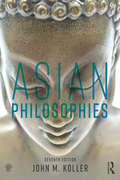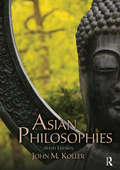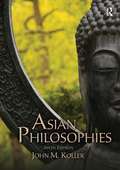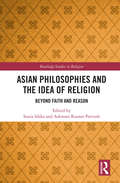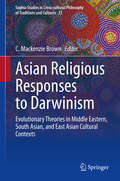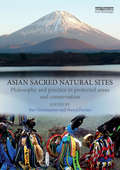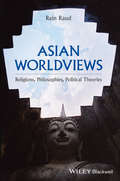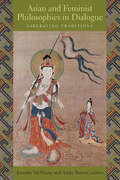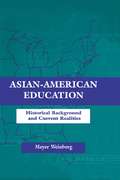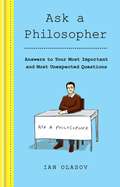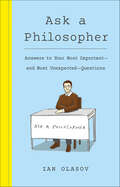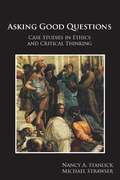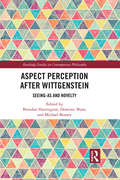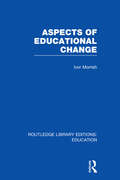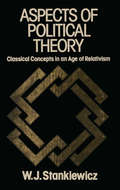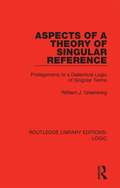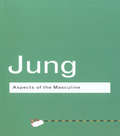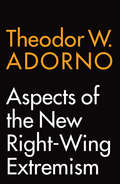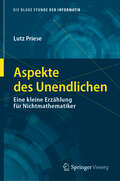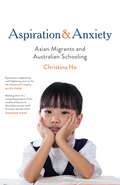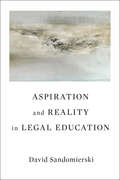- Table View
- List View
Asian Philosophies
by John M. KollerWith an inside view from an expert in the field and a clear and engaging writing style, Asian Philosophies, Seventh Edition invites students and professors to think along with the great minds of the Asian traditions. Eminent scholar and teacher John M. Koller has devoted his life to understanding and explaining Asian thought and practice. He wrote this text to give students access to the rich philosophical and religious ideas of both South and East Asia. New to this seventh edition: Added material on Confucianism, including focused coverage of (1) the Analects and society and (2) ren and nature; Additional information on Theravada Buddhism, Vajrayana Buddhism, and Zen Buddhism as well as new in-depth coverage of ecological attitudes in Buddhism; Expanded coverage of ecological attitudes in all of the Asian traditions; Brief excerpts from primary sources to help better explain the key concepts; Added timelines for essential texts in each tradition; Improved Glossary and Pronunciation Guide; Additional text boxes, to help students quickly understand key ideas, texts, and concepts; Updated Further Reading sections.
Asian Philosophies
by John M. KollerWith an inside view from an expert in the field, solid scholarship, and a clear and engaging writing style, Asian Philosophies invites students and professors to think along with the great thinkers of the Asian traditions. John M. Koller is a scholar and teacher who has devoted his life to understanding Asian thought and practice. He wrote this text to give students and professors access to the rich philosophical and religious ideas of both South and East Asia.
Asian Philosophies (6th Edition)
by John M. KollerWith an inside view from an expert in the field, solid scholarship, and a clear and engaging writing style, 'Asian Philosophies' invites students and professors to think along with the great thinkers of the Asian traditions.
Asian Philosophies and the Idea of Religion: Beyond Faith and Reason (Routledge Studies in Religion)
by Sonia Sikka Ashwani Kumar PeetushWith a focus on Asian traditions, this book examines varieties of thought and self-transformative practice that do not fit neatly on one side or another of the standard Western division between philosophy and religion. It contains chapters by experts on Buddhist, Confucian, Taoist, Hindu and Jain philosophies, as well as ancient Greek philosophy and recent contemplative and spiritual movements. The volume also problematizes the notion of a Western philosophical canon distinguished by rationality in contrast to a religious Eastern "other". These original essays creatively lay the groundwork needed to rethink dominant historical and conceptual categories from a wider perspective to arrive at a deeper, more plural and global understanding of the diverse nature of both philosophy and religion. The volume will be of keen interest to scholars and students in the Philosophy of Religion, Asian and Comparative Philosophy and Religious Studies.
Asian Religious Responses to Darwinism: Evolutionary Theories in Middle Eastern, South Asian, and East Asian Cultural Contexts (Sophia Studies in Cross-cultural Philosophy of Traditions and Cultures #33)
by C. Mackenzie BrownThis volume brings together diverse Asian religious perspectives to address critical issues in the encounter between tradition and modern western evolutionary thought. Such thought encompasses the biological theories of Charles Darwin, Jean-Baptiste Lamarck, Earnest Haeckel, Thomas Huxley, and later “neo-Darwinians,” as well as the more sociological evolutionary theories of thinkers such as Herbert Spencer, Pyotr Kropotkin, and Henri Bergson. The essays in this volume cover responses from Hindu, Jain, Buddhist (Chinese, Japanese, and Indo-Tibetan), Confucian, Daoist, and Muslim traditions. These responses come from the decades immediately after publication of The Origin of Species up to the present, with attention being paid to earlier perspectives and teachings within a tradition that have affected responses to Darwinism and western evolutionary thought in general. The book focuses on three critical issues: the struggle for survival and the moral implications read into it; genetic variation and its seeming randomness as related to the problems of meaning and purpose; and the nature of humankind and human exceptionalism. Each essay deals with one or more of the three issues within the context of a specific tradition.
Asian Sacred Natural Sites: Philosophy and practice in protected areas and conservation
by Bas Verschuuren Naoya FurutaNature conservation planning tends to be driven by models based on Western norms and science, but these may not represent the cultural, philosophical and religious contexts of much of Asia. This book provides a new perspective on the topic of sacred natural sites and cultural heritage by linking Asian cultures, religions and worldviews with contemporary conservation practices and approaches. The chapters focus on the modern significance of sacred natural sites in Asian protected areas with reference, where appropriate, to an Asian philosophy of protected areas. Drawn from over 20 different countries, the book covers examples of sacred natural sites from all of IUCN’s protected area categories and governance types. The authors demonstrate the challenges faced to maintain culture and support spiritual and religious governance and management structures in the face of strong modernisation across Asia. The book shows how sacred natural sites contribute to defining new, more sustainable and more equitable forms of protected areas and conservation that reflect the worldviews and beliefs of their respective cultures and religions. The book contributes to a paradigm-shift in conservation and protected areas as it advocates for greater recognition of culture and spirituality through the adoption of biocultural conservation approaches.
Asian Sacred Natural Sites: Philosophy and practice in protected areas and conservation
by Bas Verschuuren Naoya FurutaNature conservation planning tends to be driven by models based on Western norms and science, but these may not represent the cultural, philosophical and religious contexts of much of Asia. This book provides a new perspective on the topic of sacred natural sites and cultural heritage by linking Asian cultures, religions and worldviews with contemporary conservation practices and approaches.The chapters focus on the modern significance of sacred natural sites in Asian protected areas with reference, where appropriate, to an Asian philosophy of protected areas. Drawn from over 20 different countries, the book covers examples of sacred natural sites from all of IUCN’s protected area categories and governance types. The authors demonstrate the challenges faced to maintain culture and support spiritual and religious governance and management structures in the face of strong modernisation across Asia.The book shows how sacred natural sites contribute to defining new, more sustainable and more equitable forms of protected areas and conservation that reflect the worldviews and beliefs of their respective cultures and religions. The book contributes to a paradigm-shift in conservation and protected areas as it advocates for greater recognition of culture and spirituality through the adoption of biocultural conservation approaches.
Asian Worldviews: Religions, Philosophies, Political Theories
by Rein RaudAn ambitious comparative introduction to Asian thought, expertly written for undergraduate courses in Asian Studies, Asian philosophy and neighboring disciplines Recent decades have witnessed a sharp increase of interest in the cultures and regions of South and East Asia, owing in part to the prominent role Asian economies have played in the era of globalization. Asian Worldviews: Religions, Philosophies, Political Theories is a unique, reader-friendly introduction to the intellectual heritage of the region. Assuming no previous background in Asian cultural history, Asian Worldviews moves beyond chronological and geographic boundaries to present an integrated treatment of the beliefs, teachings, and ideologies that have shaped the worldviews of approximately half of the global population. Rein Raud explores forms of knowledge in China, India, Tibet, Japan, Korea, and Southeast Asia, providing balanced coverage of all historical periods from antiquity to the modern day. Asian Worldviews embraces the connections rather than the divisions between the religious and philosophical dimensions of South and East Asian thought, and emphasizes a robust engagement with each culture's political, social, and economic contexts. Clear, accessible chapters discuss the development of religious, philosophical, and political thought in India, China, and Japan, and provide succinct overviews of the history of ideas in Korea, Tibet, and Southeast Asia. Throughout the book, Raud uses a comparative approach to examine the mutual influence and productive dialogue, past and present, between Asian cultures as well as with the West, and considers the impact of various worldviews on the development of modern Asian societies. Comprehensive and well-informed by recent developments in the scholarship, Asian Worldviews: Religions, Philosophies, Political Theories is an unparalleled resource for a broad range of courses in Asian studies, philosophy, religious studies, and global politics, as well as an excellent introduction for non-specialist readers looking for a contextual foothold in the rich cultural and intellectual history of South and East Asia.
Asian and Feminist Philosophies in Dialogue
by Jennifer Mcweeny Ashby ButnorIn this collection of original essays, international scholars put Asian traditions, such as Hinduism, Buddhism, Daoism, and Confucianism, into conversation with one or more contemporary feminist philosophies, founding a new mode of inquiry that attends to diverse voices and the complex global relationships that define our world. These cross-cultural meditations focus on the liberation of persons from suffering, oppression, illusion, harmful conventions and desires, and other impediments to full personhood by deploying a methodology that traverses multiple philosophical styles, historical texts, and frames of reference. Hailing from the discipline of philosophy in addition to Asian, gender, and religious studies, the contributors offer a fresh take on the classic concerns of free will, consciousness, knowledge, objectivity, sexual difference, embodiment, selfhood, the state, morality, and hermeneutics. One of the first anthologies to embody the practice of feminist comparative philosophy, this collection creatively and effectively engages with global, cultural, and gender differences within the realms of scholarly inquiry and theory construction.
Asian and Feminist Philosophies in Dialogue: Liberating Traditions
by Ashby Butnor Jennifer McWeenyIn this collection of original essays, international scholars put Asian traditions, such as Hinduism, Buddhism, Daoism, and Confucianism, into conversation with one or more contemporary feminist philosophies, founding a new mode of inquiry that attends to diverse voices and the complex global relationships that define our world. These cross-cultural meditations focus on the liberation of persons from suffering, oppression, illusion, harmful conventions and desires, and other impediments to full personhood by deploying a methodology that traverses multiple philosophical styles, historical texts, and frames of reference. Hailing from the discipline of philosophy in addition to Asian, gender, and religious studies, the contributors offer a fresh take on the classic concerns of free will, consciousness, knowledge, objectivity, sexual difference, embodiment, selfhood, the state, morality, and hermeneutics. One of the first anthologies to embody the practice of feminist comparative philosophy, this collection creatively and effectively engages with global, cultural, and gender differences within the realms of scholarly inquiry and theory construction.
Asian-american Education: Historical Background and Current Realities (Sociocultural, Political, and Historical Studies in Education)
by Meyer WeinbergAsian-American Education: Historical Background and Current Realities fills a gap in the study of the social and historical experiences of Asians in U.S. schools. It is the first historical work to provide American readers with information about highly individual ethnic groups rather than viewing distinctly different groups as one vague, global entity such as "Asians." The people who populate each chapter are portrayed as active participants in their history rather than as passive victims of their culture. Each of the twelve country-specific chapters begins with a description of the kind of education received in the home country, including how widely available it was, how equal or unequal the society was, and what were the circumstances under which the emigration of children from the country occurred. The latter part of each of these chapters deals with the education these children have received in the United States. Throughout the book, instead of dwelling on a relatively narrow range of children who perform spectacularly well, the author tries to discover the educational situation typical among average students. The order of chapters is roughly chronological in terms of when the first sizable numbers of immigrants came from a specific country.
Ask a Philosopher: Answers to Your Most Important – and Most Unexpected – Questions
by Ian OlasovThe perfect gift for the smart thinker in your life.For several years Ian Olasov has set up 'Ask-a-Philosopher' booths around New York City, answering questions from passersby. Now in this book he offers answers to the real-life questions on people's minds.From the philosophical to the frivolous, questions include:- Are people innately good or bad?- Is it okay to have a pet fish?- Is it okay to have kids?- Is colour subjective?- If humans colonise Mars, who will own the land?- Is ketchup a smoothie?- Is there life after death?- Should I give money to homeless people?Every question is approached from a philosophical standpoint, but the answer is made fun and accessible for everyone. One of the many joys of this book is that you see how philosophy can be both perfectly continuous with everyday life and also utterly transporting.
Ask a Philosopher: Answers to Your Most Important—and Most Unexpected—Questions
by Ian OlasovA collection of answers to the philosophical questions on people's minds—from the big to the personal to the ones you didn't know you needed answered.Based on real-life questions from his Ask a Philosopher series, Ian Olasov offers his answers to questions such as:- Are people innately good or bad?- Is it okay to have a pet fish?- Is it okay to have kids?- Is color subjective?- If humans colonize Mars, who will own the land?- Is ketchup a smoothie?- Is there life after death?- Should I give money to homeless people?Ask a Philosopher shows that there's a way of making philosophy work for each of us, and that philosophy can be both perfectly continuous with everyday life, and also utterly transporting. From questions that we all wrestle with in private to questions that you never thought to ask, Ask a Philosopher will get you thinking.
Asking Good Questions: Case Studies in Ethics and Critical Thinking
by Nancy A. Stanlick Michael J. StrawserAsking Good Questions moves beyond a traditional discussion of ethical theory, focusing on how educators can use these important frameworks to facilitate critical thinking about real-life ethical dilemmas. In this way, authors Nancy Stanlick and Michael Strawser offer students a theoretical tool kit for creatively addressing issues that influence their own environments. This text begins with a discussion of key ethical theorists and then guides the reader through a series of original case studies and follow-up activities that facilitate critical thinking, emphasize asking thought provoking questions, and teach the student to address the complexity of ethical dilemmas while incorporating the viewpoints of their peers. Additionally, Stanlick and Strawser include an extensive preface, a mind-mapping technique for analyzing and formulating arguments, and a six step process for approaching complex real-life moral issues. Each chapter incorporates suggested assignments, discussion questions, and references for further reading, and a guide for instructors offering a sample course schedule and suggestions on how to use this book effectively is also available. This text is designed to help educators engage students in a meaningful discussion of how historical theories apply to their own lives, providing rich and unique resources to learn about these critical issues.
Aspect Perception after Wittgenstein: Seeing-As and Novelty (Routledge Studies in Contemporary Philosophy)
by Michael Beaney Brendan Harrington Dominic ShawThis volume brings together new essays that consider Wittgenstein’s treatment of the phenomenon of aspect perception in relation to the broader idea of conceptual novelty; that is, the acquisition or creation of new concepts, and the application of an acquired understanding in unfamiliar or novel situations. Over the last twenty years, aspect perception has received increasing philosophical attention, largely related to applying Wittgenstein’s remarks on the phenomena of seeing-as, found in Part II of Philosophical Investigations (1953), to issues within philosophical aesthetics. Seeing-as, however, has come to occupy a broader conceptual category, particularly in philosophy of mind and philosophical psychology. The essays in this volume examine the exegetical issues arising within Wittgenstein studies, while also considering the broader utility and implications of the phenomenon of seeing-as in the fields of aesthetics, philosophical psychology, and philosophy of mathematics, with a thematic focus on questions of novelty and creativity. The collection constitutes a fruitful interpretative engagement with the later Wittgenstein, as well as a unique contribution to considerations of philosophical methodology.
Aspects of Educational Change (Routledge Library Editions: Education)
by Ivor MorrishIn recent years teachers have realized that change has become a permanent factor on the educational scene and therefore its operation or mechanism must not just be accepted, or even rejected, but above all understood. This book presents an approach towards some real understanding of educational changes and innovations. A number of mechanisms and processes are discussed and analysed in an attempt to present some sort of overview of the agents involved in change, an analysis of the major characteristics of resisters and innovators, an account of the traits and functions of innovative institutions and a description of three particular models which delineate the way in which change occurs. In the final section of the text attention is given to some contemporary educational innovations, and some suggestions provided for dealing with problems involved in their evaluation.
Aspects of Political Theory: Classical Concepts in an Age of Relativism
by W J StankiewiczFirst published in 1976. This study continues an endeavour whose aim was to use traditional concepts as a basis for the discussion of contemporary political predicaments. The endeavour began with the publication of the symposium In Defense of Sovereignty (1969). Its long-range goal is to consider under a common denominator—relativism in politics— various aspects of theory such as the basic concepts discussed in the present essay, together with more modern theories of democracy and the wider spectrum of political ideologies.
Aspects of Psychologism
by Tim CraneAspects of Psychologism is a penetrating look into fundamental philosophical questions of consciousness, perception, and the experience we have of our mental lives. Psychologism, in Tim Crane's formulation, presents the mind as a single subject-matter to be investigated not only empirically and conceptually but also phenomenologically: through the systematic examination of consciousness and thought from the subject's point of view. How should we think about the mind? Analytical philosophy tends to address this question by examining the language we use to talk about our minds, and thus translates our knowledge of consciousness into knowledge of the concepts which this language embodies. Psychologism rejects this approach. The philosophy of mind, Crane contends, has become too narrow in its purely conceptual focus on the logical and linguistic formulas that structure thought. We cannot assume that the categories needed to understand the mind correspond absolutely with such semantic categories. Crane's claim is that intentionality--the "aboutness" or "directedness" of the mind--is essential to all mental phenomena. He criticizes materialist doctrines about consciousness and defends the position that perception can represent the world in a non-conceptual, non-propositional way, opening up philosophy to a more realistic account of the mind's nature.
Aspects of Scientific Explanation: and Other Essays in the Philosophy Of Science
by Carl G. HempelIn this volume address themselves to one or another of four major topics in the philosophy of science, and have accordingly been grouped under the headings "Confirmation, Induction, and Rational Belief," "Conceptions of Cognitive Significance," "Structure and Function of Scientific Concepts and Theories," and "Scientific Explanation.
Aspects of a Theory of Singular Reference: Prolegomena to a Dialectical Logic of Singular Terms (Routledge Library Editions: Logic)
by William J. GreenbergOriginally published in 1985. This study concerns the problem of treating identity as a relation between an object and itself. It addresses the Russellian and Fregean solutions and goes on to present in the first part a surfacist account of belief-context ambiguity requiring neither differences in relative scope nor distinctions between sense and reference. The second part offers an account of negative existentials, necessity and identity-statements which resolves problems unlike the Russell-Frege analyses. This is a detailed work in linguistics and philosophy.
Aspects of the Masculine
by C. G. JungThe concept of masculinity was crucial not only to Jung's revolutionary theories of the human psyche, but also to his own personal development. If, as Jung believed, "modern man is already so darkened that nothing beyond the light of his own intellect illuminates his world," then it is essential to show every man the limits of his understanding and how to overcome them. In Aspects of the Masculine Jung does this by revealing his most significant insights concerning the nature and motivations of masculinity, both conscious and unconscious, and explaining how this affects the development of the personality. Offering a unique perspective on the masculine, based upon both his personal and clinical experiences, Jung asks questions that remain as insistent as ever. He offers answers that--whether they surprise, shock or edify--challenge us to re-examine our contemporary understanding of masculinity.
Aspects of the New Right-Wing Extremism
by Theodor W. AdornoOn 6 April 1967, at the invitation of the Socialist Students of Austria at the University of Vienna, Theodor W. Adorno gave a lecture which is not merely of historical interest. Against the background of the rise of the National Democratic Party of Germany, which had enjoyed remarkable electoral success in the first two years after its formation in November 1964, Adorno analysed the goals, resources and tactics of the new right-wing nationalism of this time. Contrasting it with the ‘old’ fascism of the Nazis, Adorno gave particular attention to the ways in which far-right movements elicited enthusiastic support in sections of the West German population, 20 years after the war had ended. Much has changed since then, but some elements have remained the same or resurfaced in new forms, 50 years later. Adorno’s penetrating analysis of the sources of right-wing radicalism is as relevant today as it was five decades ago. It is a prescient message to future generations who find themselves embroiled once again in a struggle against a resurgent nationalism and right-wing extremism.
Aspekte des Unendlichen: Eine kleine Erzählung für Nichtmathematiker (Die blaue Stunde der Informatik)
by Lutz PrieseEin Buch über die Unendlichkeit Wer glaubt, dass sich Rechnen auf trockene Formeln und Zahlen beschränkt, wird mit „Aspekte des Unendlichen – Eine kleine Erzählung für Nichtmathematiker“ sein blaues Wunder erleben. Dieses Buch spricht alle Leser an, die nicht nur die Logik, sondern auch die Poesie der Unendlichkeit erforschen möchten. Anstatt Laien mit kryptischem Akademikerjargon zu verwirren, übersetzt es komplexe Sachverhalte in leicht verständliche Erklärungen. So können auch Einsteiger erfahren, welche Überraschungen die Mengenlehre bereithält. Von nicht abzählbaren Größen und unentscheidbaren Fragen Die Wissenschaft der mathematischen Unendlichkeit umfasst zahlreiche Problemstellungen, die ebenso anspruchsvoll wie spannend sind. Dazu gehören unter anderem:· die Bibliothek von Babel· diskontinuierliche Kontinua· Unmengen· Paradoxien und Antinomien Um solche theoretischen Ansätze in ihren Grundzügen zu begreifen, braucht es keinen Hochschulabschluss. Lutz Prieses Buch über die Mathematik der Unendlichkeit verwandelt abstrakte Konzepte in lebensnahe Zusammenhänge. Der Autor ist promovierter Logiker und hält seit seiner Pensionierung regelmäßig Vorlesungen zu Themen der Mathematik und Informatik. Dank seiner langjährigen Tätigkeit als Hochschuldozent gelingt es ihm, mit einer unterhaltsamen Sprache Anfänger und Experten gleichermaßen zu fesseln. Dabei steht vor allem die Verbindung zwischen mathematischen und philosophischen Problemen im Vordergrund:· Wie genau können wir mit Zahlen die unendlichen Weiten des Weltalls erfassen?· Inwiefern spiegeln die Grenzen des Rechnens die Grenzen des menschlichen Daseins wider?· Wie können wir Unvorstellbares vorstellbar machen? Prieses Buch über die Unendlichkeit in der Mathematik liefert keine endgültigen Antworten auf diese Fragen. Vielmehr regt es Leser dazu an, sich selbst auf die Suche zu machen und eigene Ideen zu entwickeln. Wie es der Titel verspricht, lädt „Aspekte des Unendlichen“ zu einer schier endlosen Reise durch die Gedankenwelt ein.
Aspiration and Anxiety: Asian Migrants and Australian Schooling
by Christina HoThe children of Asian migrants are often perceived to be perfect students: ambitious, studious and compliant. They are remarkably successful-routinely outperforming other students in exams, dominating selective school intakes, and disproportionately winning places at prestigious universities. While their hard work and success have been praised, their achievements have ignited fierce debates about whether their migrant parents are 'pushing too hard', or whether they ought to be lauded for their commitment to education. Critics see a dark side, symbolised by the 'tiger mother' who is obsessed with producing overachieving 'dragon children'. What is often missing in these debates is an understanding of what drives Asian migrant parents' approaches to education. This book explores how aspirations for their children's future reinforce their anxieties about being newcomers in an unequal society.
Aspiration and Reality in Legal Education (G - Reference,information And Interdisciplinary Subjects Ser.)
by David SandomierskiContrary to conventional narratives about legal education, Aspiration and Reality in Legal Education reveals a widespread desire among law teachers to integrate both theory and practice into the education of versatile and civic-minded lawyers. Despite this stated desire, however, this aspiration is largely unrealized due to a host of intellectual and institutional factors that produce a profound gap between what professors believe about law and the ideas they communicate through their teaching. Drawing on interviews with over sixty law professors in Canada, David Sandomierski makes two important empirical discoveries in this book. First, he establishes that, contrary to a dominant narrative in legal education that conceives of theory and practice as oppositional, the vast majority of law professors consider theory to be vitally important in preparing "better lawyers." Second, he uncovers a significant gap between the realist theoretical commitments held by a majority of professors and the formalist theories they almost uniformly convey through their teaching and conceptions of legal reasoning. Understanding the intellectual and institutional factors that account for these tensions, Sandomierski argues, is essential for any meaningful project of legal education reform.
